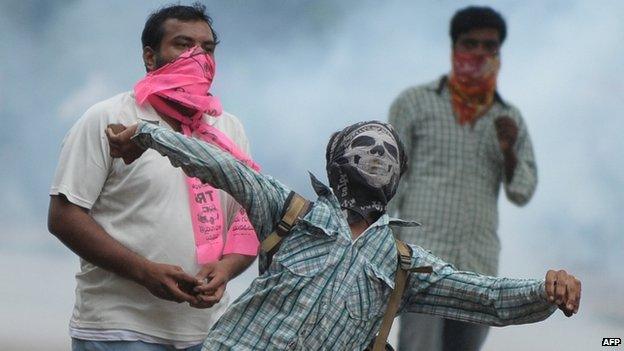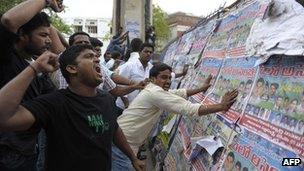What new Telangana state means for India
- Published

Violent protests have taken place in Andhra Pradesh for the creation of Telangana
India's ruling Congress party-led government has announced the formation of a new state of Telangana to be carved out of the southern state of Andhra Pradesh. Analyst Louise Tillin explains what this means for India.
The creation of Telangana reflects the end of a long journey for those who have campaigned for statehood - and the beginning of a fresh set of wrangles over the shaping of the new state.
The movement for Telangana has rolled on for decades with peaks and troughs of popular mobilisation. Electoral alliances have been made and broken in the name of statehood. Short term political calculations by a nervy Congress party ahead of next year's elections have governed Tuesday's announcement more than grander visions about the restructuring of Indian political or economic life.
So what does the decision to create the state mean for India more generally, and for those interested in the shape of its democracy?
Linguistic states
The splitting of Andhra Pradesh marks the first time in India's post-Independence history that a "linguistic state" - a state created for speakers of a regional language, in this case Telugu - has been divided.
Indeed it was in the Andhra region that the strongest campaign for the reorganisation of state boundaries around linguistic communities - rather than administrative histories - took place in the early 1950s.
Protests that followed the death of a local political leader on hunger strike led India's first prime minister, Jawaharlal Nehru, to concede the division of the previously bilingual Madras state.
The Telugu-speaking districts of Telangana were then added to the eventual state of Andhra Pradesh. And in the coming years, further linguistic states were created in south and west India.
States were created for speakers of Kannada (present-day Karnataka), Malayalam (Kerala), Marathi (Maharashtra) and Gujarati (Gujarat); and later Punjab and Haryana were divided too (although religion, as well as language - Punjabi and Hindi - was at stake in the latter instance).
With the exception of India's numerically preponderant Hindi speakers (more than 40% of the population) who are spread across multiple states in central and northern India, most other Indian states are now home to a single dominant regional linguistic community.
Nehru had previously opposed such a scenario for fear of creating inward-looking states that would imperil the consolidation of Indian nationhood, and even encourage separatism.
Yet, language did become a dominant pillar of regional political community. The regionalisation of Indian politics in the last few decades is a story that is firmly rooted in these linguistic states.
Since 1989, no single national party has won a majority of parliamentary seats across India. Many of the regional parties which are now critical players in federal coalition governments derived strength from regional nationalist identities grounded in language.
Rather than promoting the break-up of India, the ability of the central government to create new states has in many - though not all - cases helped to accommodate regional aspirations.
In more recent years, several new states have been created in the Hindi belt where language has not been a major issue.
In 2000, the states of Chhattisgarh and Jharkhand were created in regions with sizeable tribal populations, and following a decades-long movement for a tribal state in Jharkhand. The hill state of Uttarakhand was also created in the Himalayan districts of Uttar Pradesh.
Across the Hindi belt, the deepening politicisation of lower castes made it harder to hold together large states that had previously been bastions of upper-caste and class dominance.
Thus the creation of new states has been embedded in the decentralisation of political life.
Beyond language
In the case of Telangana, we also see a statehood movement that has moved beyond language as a basis for political community.
Telangana was one of a new generation of statehood demands in the late 1960s and early 1970s made on the grounds of regional inequality.

Activists say Telangana has been ignored for years
The more contemporary resurrection of the statehood demand has also challenged patterns of social and political dominance that have crystallised in the state of Andhra Pradesh in the context of economic liberalisation.
The state capital, Hyderabad, is a mega-city deeply connected to global flows of capital and people. It is the location of Facebook's new India headquarters. Hyderabad sits geographically in the Telangana region, but its connections to the rural hinterlands of the region are strained.
The experience of other new states in India shows that statehood is not likely to be a simple panacea for regional inequality.
After statehood comes the hard task of choosing new political leaders, building new administrative structures, raising revenues, and negotiating with the central government.
Statehood movements can be propelled by the singularity of purpose of demanding a new state.
But beyond the goal of statehood lie multiple interests and visions which will need to be accommodated.
Telangana - and the remainder of Andhra Pradesh - may also face the further challenge of sharing Hyderabad as a state capital. Hyderabad, which will remain a centre of economic activity, is physically located within the Telangana state but may itself be separately administered as a Union Territory.
Furthermore, this is the first time that the central government has moved to create a new state in the face of such opposition from the "parent" state.
The creation of Telangana has been prompted by short-term electoral manoeuvres.
But it reflects longer term histories of political decentralisation and economic change.
It is likely to spur debates about the merits of creating more states in other regions, as well as to bequeath administrative challenges for the inheritors of statehood in both parts of the reorganised state of Andhra Pradesh.
Dr Louise Tillin is a lecturer in politics at King's College, London and author of Remapping India: New States and Their Political Origins.
- Published30 July 2013